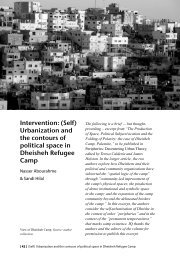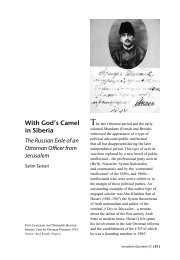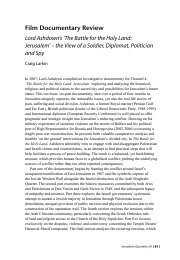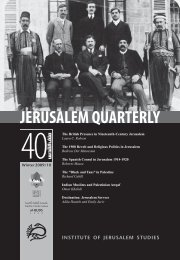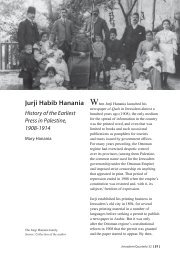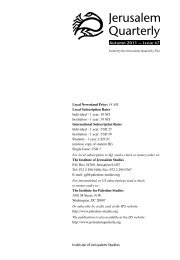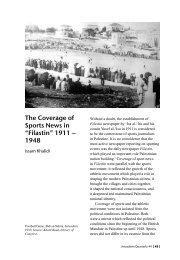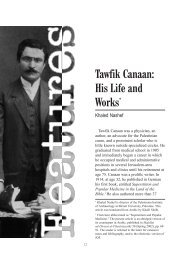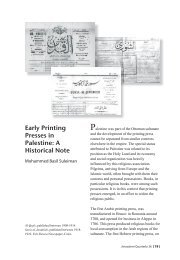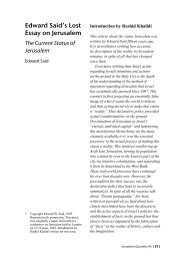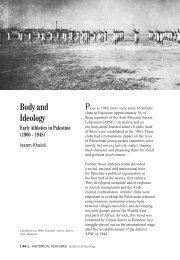PLUNDERING PALESTINE - Jerusalem Quarterly
PLUNDERING PALESTINE - Jerusalem Quarterly
PLUNDERING PALESTINE - Jerusalem Quarterly
Create successful ePaper yourself
Turn your PDF publications into a flip-book with our unique Google optimized e-Paper software.
epatriating antiquities are still extremely divided. The Palestinians say that the<br />
Israelis promised them a list of all artefacts taken from the territories in preparation<br />
for repatriation, while the Israelis say the list is only for archaeological sites that<br />
have been excavated, which has been already provided to the relevant Palestinian<br />
authorities.<br />
Palestinians use the Egyptian example as precedence for their claims. In 1994, Israel<br />
returned to Egypt all antiquities from excavations conducted in Sinai since 1967, up<br />
to the last pottery sherd, accompanied by scientific reports, drawings and photos. The<br />
Israeli government recognized that the proper place for those antiquities is in Sinai,<br />
but it remains to be seen if the antiquities of the West Bank and the Gaza Strip will be<br />
repatriated in the same manner.<br />
In the meantime, measures must be taken to prevent looting and the loss of<br />
irreplaceable archaeological sites to the advancement of the Wall. Isolating sites<br />
from their natural surroundings and excavating them in a hasty manner are not<br />
acceptable archaeological preservation and protection methods. The Wall is damaging<br />
archaeological sites and alienating the Palestinian people from their cultural heritage.<br />
The World Archaeological Congress warned of this in 7 January, 2004, to no avail. If<br />
left unchecked, these problems will evolve into a diminished future for a people that<br />
have long flourished from their rich cultural heritage.<br />
Adel H. Yahya is the director of the Palestinian Association for Cultural Exchange (PACE). For<br />
more information, see www.pace.ps.<br />
Endnotes<br />
1<br />
See David Ilan, U. Dahari and G. Avni, “Plundered!<br />
The Rampant Rape of Israel’s Archaeological Sites,”<br />
Biblical Archaeological Review (March/April) 38-<br />
41.<br />
2<br />
Morag Kersel, “Archaeology’s Well Kept Secret:<br />
The Managed Antiquities Market,” in SOMA 2003,<br />
Symposium on Mediterranean Archaeology, eds.<br />
C. Briault, J. Green, A. Kaldelis, Anna Stellatou<br />
(Oxford: BAR International Series 1391, 2005) 81.<br />
3<br />
L. Borodkin, “The Economics of Antiquities<br />
Looting and a Proposed Legal Alternative,”<br />
Columbia Law Review 95, 377.<br />
4<br />
Dan Ephron, “The Tomb Raiders,” 2001,<br />
http:www.msnbc.com/news/585402.asp?cp1=1.<br />
5<br />
See Megan Goldin, “Grave Robbers Ransack<br />
Holy Land History. Hundreds of Archaeological<br />
Sites Raided Every Year. http://www.msnbc.msn.<br />
com/id/6718151, accessed 3 Sept., 2005.<br />
6<br />
Mark Schulman, “Rise in Antiquities Theft<br />
Vexes Israel’s Indiana Joneses,” Christian Science<br />
Monitor, 14 November, 2001, http.//www.csmonitor.<br />
com/2002/1114/p18s01-stgn.html.<br />
7<br />
James Pritchard (1909-1997) led excavations in<br />
al-Jib (Gibeon) from 1957-1962. A highly-respected<br />
archaeologist and professor at the University of<br />
Pennsylvania, Pritchard would almost certainly<br />
not have engaged in activities he considered illegal.<br />
However, the villager’s comment highlights the<br />
way that a zeal for acquisition of artefacts –perhaps<br />
particularly in the school of Biblical archaeology<br />
–creates a demand that encourages illegal digging,<br />
whether in the 1950s or today.<br />
8<br />
Scholman.<br />
[ 54 ] FEATURES VieLooting and ‘Salvaging’



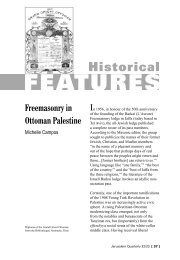
![In Search of Jerusalem Airport [pdf] - Jerusalem Quarterly](https://img.yumpu.com/49007736/1/180x260/in-search-of-jerusalem-airport-pdf-jerusalem-quarterly.jpg?quality=85)
